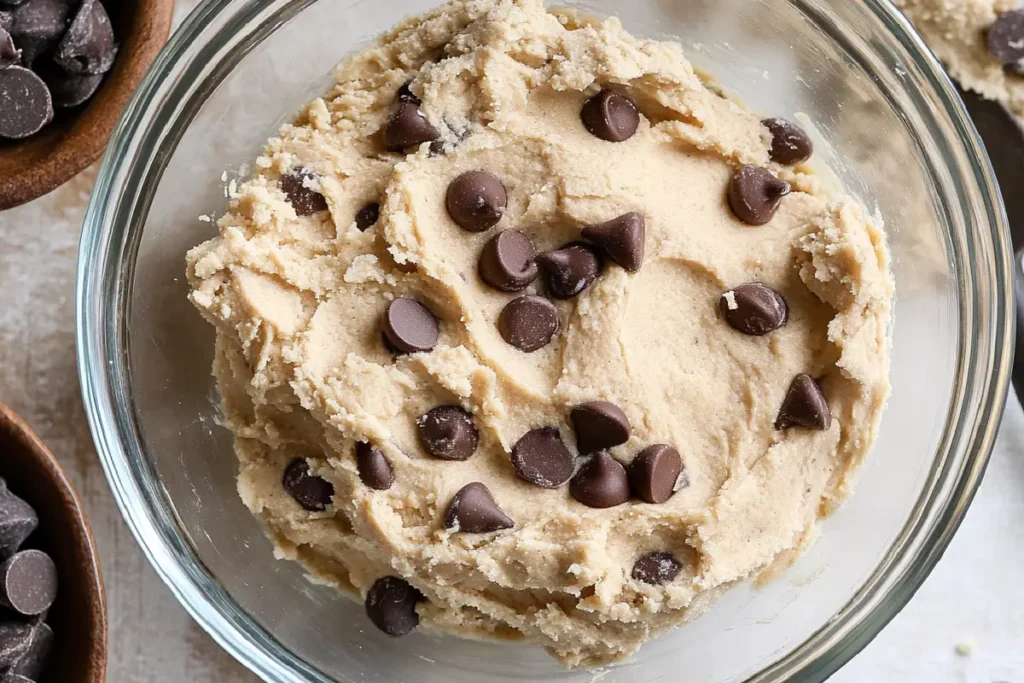Table of Contents: How Healthy Are Protein Cookies? 7 Reasons to Try Them Today
Introduction: How Healthy Are Protein Cookies?
Imagine biting into a cookie that’s chewy, chocolate-studded, and secretly good for you. Sounds too good to be true? Welcome to the world of protein cookies! Gone are the days of choosing between satisfying your sweet tooth and fueling your body. Whether you’re a gym enthusiast, a busy parent, or just someone who loves snacks without the guilt, these cookies are about to become your new obsession.
I’ll never forget the first time I baked a batch for my skeptical nephew. “Healthy cookies? No way,” he scoffed—until he devoured three in one sitting. The secret? They’re packed with protein, low in refined sugar, and customizable to fit any craving (yes, even peanut butter cup!). Think of them as the lovechild of your favorite dessert and a post-workout shake.
Like our viral 5-Ingredient Protein Bars, these cookies are simple, budget-friendly, and ready in under 30 minutes. But here’s the kicker: they’re so delicious, no one will guess they’re healthy. Ready to bake magic? Let’s dive in!
What Are Protein Cookies?
Let’s address the elephant in the room: Why are they called “protein cookies”? Are they cookies that lift weights? Do they come with a side of dumbbells? Not quite. The name is delightfully literal—these treats swap empty calories for protein-packed ingredients like oats, nut butter, and whey or plant-based protein powder.
I like to joke that they’re the culinary equivalent of a superhero in disguise. One minute, you’re enjoying a fudgy, melt-in-your-mouth cookie; the next, you’re fueled for a workout or a Netflix marathon. As the old saying goes, “The way to someone’s heart is through their stomach”—and these cookies might just steal yours.
So, are they actually cookies? Yes. Do they taste like cardboard? Absolutely not. Ready to see for yourself? Let’s bake!
Why You’ll Love This Recipe

- Nutrition Meets Indulgence: With 10g of protein per cookie and zero guilt, these satisfy cravings while keeping energy levels steady—no mid-afternoon crash here!
- Cheaper Than Store-Bought: Store-bought protein cookies cost up to $3 each. This recipe? Just pennies per serving!
- Endlessly Customizable: Add dark chocolate chips, dried fruit, or even a sprinkle of sea salt. They’re as versatile as your imagination.
If you loved our High-Protein Banana Bread, you’ll adore these cookies. Both recipes prove that “healthy” doesn’t mean “boring.” So, grab your mixing bowl—it’s time to upgrade your snack game!
How to Make Protein Cookies
Quick Overview: Whip up these no-fuss cookies in 25 minutes! They’re gluten-free, dairy-free (if using plant-based protein), and perfect for meal prep.
Key Ingredients
(Include a high-quality image of ingredients here)
- 1 cup oat flour (or blended oats)
- ½ cup vanilla protein powder
- ⅓ cup almond butter
- ¼ cup honey or maple syrup
- 1 tsp vanilla extract
- ½ cup dark chocolate chips
Step-by-Step Instructions
- Mix Dry Ingredients: Combine oat flour, protein powder, and a pinch of salt.
- Blend Wet Ingredients: Stir almond butter, honey, and vanilla until smooth.
- Combine: Fold wet mix into dry ingredients. Add chocolate chips.
- Bake: Scoop dough onto a tray, flatten slightly, and bake at 350°F for 12 minutes.
What to Serve With Protein Cookies
- Almond Milk Latte: Dunk ’em for a cozy treat.
- Greek Yogurt Parfait: Crumble cookies over yogurt for crunch.
- Post-Workout Smoothie: Pair with a berry-protein blend.
Top Tips for Perfecting Protein Cookies
- Swap Wisely: Use sunflower seed butter for nut-free, or collagen powder for extra protein.
- Don’t Overbake: They firm up as they cool!
- Sweetness Hack: Add mashed banana if you prefer sweeter dough.
Storing and Reheating Tips
- Fridge: Keep in an airtight container for up to 1 week.
- Freeze: Layer cookies between parchment paper; freeze for 3 months.
- Reheat: 10 seconds in the microwave revives that gooey texture!
FAQs: How Healthy Are Protein Cookies?

1. Can I substitute the protein powder?
Absolutely! Use collagen peptides, plant-based protein, or even unflavored whey. Just avoid powders with added sugars or artificial flavors for the healthiest version.
2. Are these cookies keto-friendly?
They can be! Swap honey for sugar-free maple syrup and use keto-approved chocolate chips. Adjust protein powder to match your macros.
3. Why are my cookies too dry/crumbly?
This usually happens if the dough lacks moisture. Add 1-2 tbsp of almond milk or mashed banana to bind the ingredients better.
4. Can kids eat protein cookies?
Yes! They’re perfect for lunchboxes or after-school snacks. For picky eaters, try adding mini M&Ms or rainbow sprinkles.
5. How do I make these vegan?
Use plant-based protein powder, maple syrup instead of honey, and dairy-free chocolate chips. Easy peasy!
6. Are protein cookies better than store-bought ones?
Health-wise, yes! Homemade versions skip preservatives, excess sugar, and artificial additives. Plus, they’re way cheaper.
7. Can I freeze the dough?
Definitely! Roll dough into balls, freeze on a tray, then transfer to a bag. Bake straight from frozen—just add 1-2 extra minutes.
Conclusion
So, how healthy are protein cookies? The answer is clear: they’re a game-changer for anyone craving a snack that’s both nourishing and indulgent. Whether you’re meal-prepping for the week, fueling up post-workout, or simply treating yourself to a guilt-free dessert, these cookies deliver on taste and nutrition. Remember my skeptical nephew? He now requests a fresh batch every Sunday—proof that even the pickiest eaters can’t resist them.
Best of all, this recipe is your blank canvas. Swap ingredients, experiment with flavors, and make it your own. After all, the best part of cooking is the joy of creating something uniquely yours. So, preheat that oven, grab your mixing bowl, and let those chocolate chips rain down. Your future self (and taste buds) will thank you.
Print
Healthy Protein Cookies
- Total Time: 25 minutes
- Yield: 12 cookies 1x
- Diet: Gluten Free
Description
“How healthy are protein cookies?” Find out with this easy, chewy recipe! Packed with 10g of protein per cookie, these guilt-free treats are gluten-free, customizable, and ready in 25 minutes. Perfect for snacks, post-workout fuel, or sneaking veggies into picky eaters’ diets!
Ingredients
- 1 cup oat flour (or blended rolled oats)
- ½ cup vanilla protein powder (whey or plant-based)
- ⅓ cup creamy almond butter (or sunflower seed butter)
- ¼ cup honey or maple syrup
- 1 tsp vanilla extract
- ½ cup dark chocolate chips (dairy-free if needed)
- Pinch of sea salt
Instructions
- Preheat oven to 350°F (175°C) and line a baking sheet with parchment paper.
- Mix dry ingredients: In a bowl, combine oat flour, protein powder, and salt.
- Blend wet ingredients: Stir almond butter, honey, and vanilla until smooth.
- Combine: Fold wet mixture into dry ingredients. Add chocolate chips.
- Scoop dough: Roll into 12 balls, flatten slightly, and bake for 12 minutes.
- Cool: Let cookies rest for 10 minutes—they’ll firm up as they cool!
Notes
- Nut-free? Use sunflower seed butter.
- Lower sugar? Swap honey for mashed banana.
- Vegan? Opt for plant-based protein and maple syrup.
- Storage: Keep in an airtight container for up to 1 week.
- Pro tip: Don’t overbake! Cookies will look soft but set while cooling.
- Prep Time: 13 minutes
- Cook Time: 12 minutes
- Category: Snacks, Desserts, Healthy
- Method: Baking
- Cuisine: American
Nutrition
- Serving Size: 1 cookie
- Calories: 125
- Sugar: 4g
- Sodium: 45mg
- Fat: 6g
- Saturated Fat: 2g
- Unsaturated Fat: 3g
- Trans Fat: 0g
- Carbohydrates: 12g
- Fiber: 2g
- Protein: 10g
- Cholesterol: 5mg (if using whey protein)
Keywords: How Healthy Are Protein Cookies, healthy protein cookies, easy protein cookie recipe, gluten-free protein snacks, homemade protein cookies

